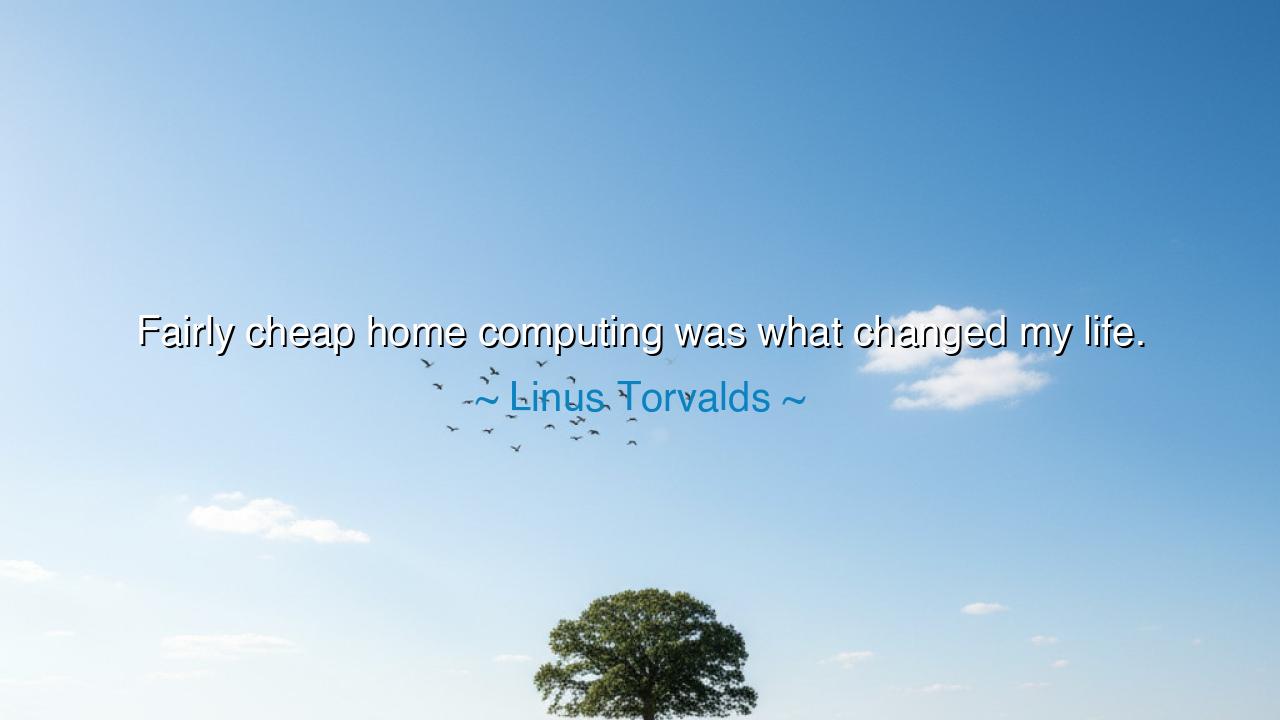
Fairly cheap home computing was what changed my life.






In the humble yet world-shifting words of Linus Torvalds, creator of the Linux operating system, we find a truth that bridges the ancient spirit of discovery and the modern flame of innovation: “Fairly cheap home computing was what changed my life.” This statement, though spoken plainly, is no small confession. It is the testimony of a man who glimpsed destiny through the hum of a machine. Beneath its simplicity lies a vast and sacred idea — that access to knowledge, not privilege or power, is what awakens genius. For Torvalds, the arrival of affordable computers was not merely a convenience; it was a revelation, the opening of a new frontier in the human spirit.
Like the philosophers of old who found truth by observing the stars, Torvalds found his cosmos within circuits and code. His words remind us that revolutions rarely begin in palaces — they begin in humble rooms, in the quiet determination of those who dare to explore. Before the age of personal computing, knowledge was guarded by institutions, and power belonged to the few. But when technology entered the home, it democratized creation. The young student in Finland, with no grand resources or royal patrons, was able to build something that would transform the digital world. From that modest beginning came Linux, the foundation upon which the internet, modern computing, and even the devices in our hands were built. Thus, “fairly cheap home computing” became not only the tool of one man’s success but the seed of an entire civilization’s advancement.
The ancients would have seen in this story the same pattern they revered in their heroes — the meeting of opportunity and preparation. Consider Archimedes, who discovered the laws of buoyancy not in the grandeur of a royal court, but in the simplicity of a bath. Or Gutenberg, whose printing press, crafted in a small workshop, gave rise to an age of enlightenment. So too did Torvalds’ modest computer become the modern philosopher’s stone, transforming code into community, invention into liberation. His story is not just about technology; it is about how accessibility empowers the spirit of creation, and how a tool in the hands of the curious can alter the course of history.
Yet there is also humility in his words — a reminder that greatness does not always come from brilliance alone, but from the conditions that nurture it. Torvalds knew that he stood on the shoulders of progress: the engineers who designed the hardware, the thinkers who developed programming languages, the educators who taught the fundamentals. In saying that home computing “changed my life,” he honors the invisible network of innovation that made it possible. His gratitude is a kind of wisdom — for the wise understand that no miracle happens in isolation. Every breakthrough is part of a chain of human effort stretching back through centuries of thought and toil.
There is, too, a moral lesson hidden within his reflection. The democratization of technology — making knowledge affordable and accessible — is not merely an economic victory, but a moral one. When tools of creation are reserved only for the elite, the world stagnates; when they are placed in the hands of the many, the world awakens. Torvalds’ life is proof that a single curious mind, given the means to explore, can enrich the lives of millions. Just as the printing press spread literacy and thought, so too did the personal computer spread empowerment — giving ordinary people the power to build, to question, to innovate. The revolution he speaks of is not technological alone, but human and spiritual.
The story of Torvalds also reminds us that simplicity is the mother of genius. His first tools were not advanced or luxurious; they were “fairly cheap.” Yet within those limitations, he discovered boundless freedom. Like the sculptor who sees the statue within the stone, he saw possibility within the machine. The ancients taught that true mastery lies not in abundance, but in understanding and creativity — in the ability to draw greatness from simplicity. In this way, Torvalds echoes the timeless principle that it is not wealth or privilege that breeds innovation, but curiosity, patience, and persistence.
The lesson, then, is this: never underestimate the power of opportunity, no matter how small. The tool that seems trivial today may become the instrument of tomorrow’s transformation. Seek out knowledge; make use of what is within reach; let your curiosity be relentless. For as Linus Torvalds teaches us, even the most ordinary tools, when wielded by a passionate spirit, can open doors to extraordinary destinies. The true revolution begins not with wealth, but with access, not with abundance, but with imagination.
So, dear listener, remember this when you next sit before your own machine, however humble. The screen before you is not just a device — it is a gateway. Within it lies the same power that changed Torvalds’ life, the same power that built civilizations and kindled stars of knowledge across history. Use it not only to consume, but to create. For greatness often begins, not in the grandeur of empires, but in the quiet hum of a “fairly cheap computer” — and in the boundless mind of the one who dares to dream through it.






AAdministratorAdministrator
Welcome, honored guests. Please leave a comment, we will respond soon